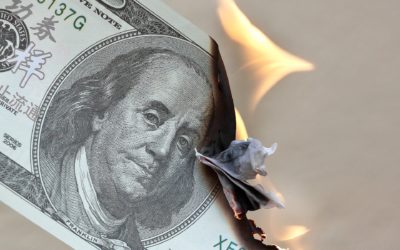A large number of employees have been confronted with increased job insecurity in recent months. Combined with the currently prevailing low interest rate, this has led many people to look for alternative sources of income. One example of this is the increased interest in the financial markets, where many new investors are investing their capital. However, this raises the question of what exactly an investment actually is and whether the new investors are actually investing their capital or whether they are speculating. This post will look at what exactly an investment is, what asset classes can be invested in and how investing differs from speculating.
Disclaimer
All content and statements within the blog posts are researched to the best of our knowledge and belief and, if possible, presented in an unbiased manner. If sources are used, they are indicated. Nevertheless, we explicitly point out that the content should not be understood as facts, but only as a suggestion and thought-provoking ideas for the own research of the readers. We assume no liability for the accuracy and/or completeness of the content presented.
First of all, it is necessary at this point to define the term investment. This is defined in the Cambridge Dictionary as follows:
“The act of putting money, effort, time, etc. into something to make a profit or get an advantage, or the money, effort, time, etc. used to do this.”¹
At this point, it should be emphasized that these are not exclusively financial investments, but that this definition only takes into account the use of (scarce) resources. For example, (academic) education can also be understood as an investment, since a person invests his or her own time with the intention of gaining an advantage or generating a higher income at a later point in time. In the further course of this post, however, we will focus on investments that are based on the use of capital.
In the financial world, a distinction is essentially made between investing and speculating, although there is no definitive demarcation between the two terms. In practice, the distinction is usually made on the basis of the investment horizon or the risk taken. In investing, the capital investment is usually long-term, whereas speculative investments are usually aimed more at short-term success.² In addition, the risk taken in investing is usually significantly lower than in speculating, since a profit is always expected in an investment, whereas in speculating losses are also accepted in order to maintain the chance of exceptionally high profits.³
However, such a distinction is not free of criticism. Max et al. (2020), for example, criticize this form of distinction and point out that its practical application has strong limitations, since the underlying situation always has a significant impact on decisions. While in a given situation a capital investment has a speculative character, a comparable capital investment could be a form of investment considering a changed situation. Instead, they argue that the concepts of investment and speculation are so intertwined that a clear distinction may not be possible at all. Rather, the respective practical use in language usage results from the (perceived) positive or negative consequences of the respective action. The social perception of an investment tends to be positive, whereas the perception of speculation tends to be negative.⁴
As already mentioned in the previous sections, it is not straightforward to find a suitable demarcation between investing and speculating. Consequently, it is also not surprising that the actual use of the two terms varies in practice. It is conceivable that a valuation already accompanies the respective use, even if it is at least questionable whether this is justified. If it is now a question of assessing whether the new investors are more likely to invest or speculate, the problem of demarcation must therefore be taken into account. It could be argued, for example, that many new investors may not even be in a position to make appropriate investment decisions due to lack of experience and insufficient knowledge. In this argument, however, it would be assumed that a capital investment is only an investment if extensive analyses of the investment product as well as of the market conditions are carried out in advance. At the same time, it could be argued that the risk taken by inexperienced investors is higher, but that they do not speculate because the capital investment is made with a long-term investment horizon. This dependence on subjective judgment makes it almost impossible to answer the question above. It is possible that the majority of new investors are indeed looking for a long-term capital investment. However, due to the current hype – especially with regard to the stock market – it is also conceivable that many new investors make rash decisions here and give in to the current hype or FOMO (fear of missing out). In addition, the general question arises as to whether it makes sense at all to participate in the financial market in times of increased uncertainty. Why this may be problematic for a private individual will be considered in the next section.
Regardless of how high the probability is that a positive return will be achieved through the capital investment, there is always the possibility that the investor will suffer a loss. Therefore, in practice, certain conditions should be met before people participate in the financial market. A private investor should only invest if he is prepared to lose all his invested capital in the worst case. In uncertain economic times, when there is also an increased risk of losing supposedly secure sources of income such as wages, individuals should thus weigh up even more carefully whether they can and want to bear the risk of loss. In such a situation, it is usually advantageous to have at least a basic cash reserve for possible emergencies before investing capital in the financial market. Once the decision has been made to invest, there are a large number of different asset classes in which private investors can invest, so it may be difficult to keep track of everything. The spectrum of investments ranges from bonds and various equity investments to real estate and options or certificates. How and in which assets one actually invests always depends on the individual preferences of the respective investor. However, it should be noted that these sometimes have serious differences in terms of their risk. A more detailed look at the individual asset classes would go beyond the scope of this post. Finally, it should be mentioned that investors should set themselves clear goals as to what they want to achieve with their investments and when this goal should be achieved. This helps to avoid setting unrealistic goals and to pursue a consistent strategy that promises the highest chance of success.
An investment is understood to be the use of a scarce resource for the purpose of gaining an advantage or an increase in financial value at a later date. In practical use within the financial world, it is not easy to find a suitable distinction between investing and speculating. Often, a distinction is attempted by the duration of the investment horizon or the risk taken. However, this approach is also criticized as it may not be realistic, as the two terms are closely related, and as it neglects situational influences. In addition to the problems with the linguistic use of the terms, other difficulties arise, especially for private investors, when it comes to deciding whether, when and in what to invest. Only if they are prepared to bear the risk associated with a capital investment and are aware of the potential consequences should they participate in the financial markets.
¹ Cambridge Dictionary. N.d. “INVESTMENT | definition in the Cambridge English Dictionary.” Cambridge Dictionary. Accessed March 29, 2021.
https://dictionary.cambridge.org/dictionary/english/investment.
² Hayes, Adam (Reviewed by Michael J. Boyle). 2021. “Investment”. Investopedia. Accessed March 29, 2021.
https://www.investopedia.com/terms/i/investment.asp.
³ Nguyen, Joseph. 2020. “Investing vs. Speculating: What´s the Difference?”. Investopedia. Accessed March 29, 2021.
https://www.investopedia.com/ask/answers/09/difference-between-investing-speculating.asp.
⁴ Max, R., Kriebitz, A., & Luetge, C. (2020). Economic Activities under Uncertainty: The Difference between Speculation, Investment and Gambling. Journal of Management and Sustainability. 10(1), 28-37.
https://doi.org/10.5539/jms.v10n1p28.



